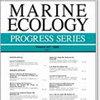Interdecadal variabilities in growth and temperature trajectories of Trachurus japonicus juveniles: 1960s-1970s versus 2000s-2010s
IF 2.1
3区 环境科学与生态学
Q2 ECOLOGY
引用次数: 0
Abstract
ABSTRACT: Changes in the distribution range and timing of life events in fish in response to warming oceans have been reported in several marine ecosystems. However, few studies have demonstrated the impact of increasing temperature on the individual growth and thermal trajectories of fish. We examined the growth and temperature trajectories of juvenile Japanese jack mackerel Trachurus japonicus in the western waters off Kyushu, Japan, based on growth increments and high-resolution isotopic analyses of archived otoliths between the 1960s-1970s and 2000s-2010s. T. japonicus juveniles in the 2000s-2010s hatched from February to April, whereas juvenile hatching in the 1960s-1970s ranged from March to May, corresponding to earlier spawning in recent decades. The otolith radius from the nucleus to specific dates represents the somatic growth trajectory of the fish: this distance was larger from April to August in the 2000s-2010s than that in the 1960s-1970s, indicating that earlier hatching in the 2000s-2010s resulted in a larger body size throughout life than in the 1960s-1970s. The trajectories of the oxygen stable isotope ratios in otoliths showed that the temperatures experienced by the fish from spring to summer were comparable between the study periods. Our results suggest that warming during late winter in recent decades has resulted in earlier spawning and occurrence of T. japonicus juveniles, resulting in the fish experiencing comparable thermal conditions between the 2 study periods. The phenological shift in spawning seemed to be recorded in individual growth and the temperature trajectories in the otoliths of T. japonicus.日本鳟幼鱼生长和温度轨迹的年代际变异:1960-1970 年代与 2000-2010 年代的对比
摘要:据报道,在一些海洋生态系统中,鱼类的分布范围和生活事件发生的时间会随着海洋变暖而发生变化。然而,很少有研究证明温度升高对鱼类个体生长和热轨迹的影响。我们根据 1960-1970 年代和 2000-2010 年代期间日本九州西部海域日本竹筴鱼幼鱼的生长增量和存档耳石的高分辨率同位素分析,研究了日本竹筴鱼幼鱼的生长和温度变化轨迹。2000 年代至 2010 年代的日本栉水母幼体孵化期为 2 月至 4 月,而 1960 年代至 1970 年代的幼体孵化期为 3 月至 5 月,这与近几十年较早的产卵期相对应。从鱼核到特定日期的耳石半径代表了鱼体的生长轨迹:2000-2010年代的4月至8月的耳石半径大于1960-1970年代的耳石半径,这表明与1960-1970年代相比,2000-2010年代的幼鱼孵化较早,因此其一生的体型都较大。耳石中氧稳定同位素比值的变化轨迹表明,研究期间鱼类从春季到夏季所经历的温度相当。我们的研究结果表明,近几十年来,冬末气候变暖导致日本栉水母的产卵期和幼鱼出现的时间提前,从而使鱼类在两个研究时期所经历的温度条件相当。产卵期的物候变化似乎记录在日本鲑的个体生长和耳石的温度轨迹中。
本文章由计算机程序翻译,如有差异,请以英文原文为准。
求助全文
约1分钟内获得全文
求助全文
来源期刊

Marine Ecology Progress Series
环境科学-海洋学
CiteScore
5.30
自引率
8.00%
发文量
238
审稿时长
3 months
期刊介绍:
The leading journal in its field, MEPS covers all aspects of marine ecology, fundamental and applied. Topics covered include microbiology, botany, zoology, ecosystem research, biological oceanography, ecological aspects of fisheries and aquaculture, pollution, environmental protection, conservation, and resource management.
 求助内容:
求助内容: 应助结果提醒方式:
应助结果提醒方式:


